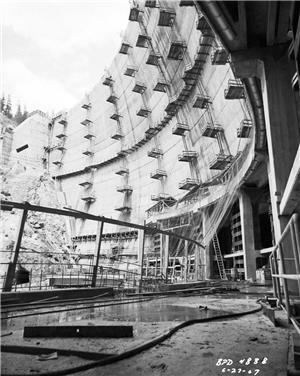On September 1, 1967, the first commercial electricity from Seattle City Light's new Boundary Dam arrives in Seattle. The thin-arch, concrete dam sits in Box Canyon on the Pend Oreille River in northeastern Washington. Its four generators produce 600,000 kilowatts of current, more than any other powerhouse on the City Light system.
Current is shipped only a short distance to the transmission lines of the Bonneville Power Administration. Through a "wheeling" arrangement (the transmission of electricity produced by one utility through facilities owned by another for a fee), the Bonneville Power Administration transmits an equivalent amount of power to Seattle, 300 miles away.
The power house was built completely underground because there was no room in the narrow canyon for conventional construction. Room was left for more units and in 1985, two more generators were completed. By 1999, Boundary supplied one-half of the hydro-electricity for Seattle, 23 percent of the city's total.
When City Light planned a $143 million, 12-year rehabilitation of the dam and power house, City Light employees bid on the project. Their proposal was 25 percent below the estimate and they got the job.
Sources:
Seattle City Light Annual Report - 1986, p. 6; Seattle City Light Annual Report - 1985, p. 4; Seattle City Light Annual Report - 1967, pp. 3, 23; Seattle City Light Annual Report - 1986 , p. 11; Seattle City Light Annual Report - 1964, p. 6; Seattle City Light Annual Report - 1963, p. 8; Seattle City Light Annual Report - 1962, pp. 12-13; Seattle City Light Annual Report - 1961, p. 3; Seattle City Light Annual Report - 1959, p. 4; Seattle City Light Annual Report - 1958, p. 6; "Braman Hails Dam as Boon to Recreation," The Seattle Times, September 29, 1967, p. 6; Seattle City Light 1996 Annual Report, 4; Seattle City Light 1999 Annual Report, 9; Seattle City Light, "Our Electricity, Our Environment," brochure, 2000; Vera Springer, Power and the Pacific Northwest: A History of the Bonneville Power Administration, (Portland: U.S. Department of the Interior, 1976), p. 61. .
Licensing: This essay is licensed under a Creative Commons license that
encourages reproduction with attribution. Credit should be given to both
HistoryLink.org and to the author, and sources must be included with any
reproduction. Click the icon for more info. Please note that this
Creative Commons license applies to text only, and not to images. For
more information regarding individual photos or images, please contact
the source noted in the image credit.

Major Support for HistoryLink.org Provided
By:
The State of Washington | Patsy Bullitt Collins
| Paul G. Allen Family Foundation | Museum Of History & Industry
| 4Culture (King County Lodging Tax Revenue) | City of Seattle
| City of Bellevue | City of Tacoma | King County | The Peach
Foundation | Microsoft Corporation, Other Public and Private
Sponsors and Visitors Like You

